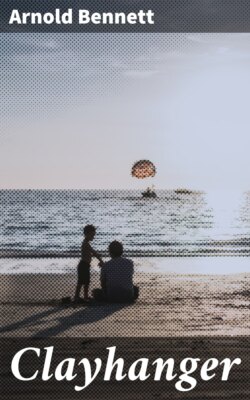Читать книгу Clayhanger - Arnold Bennett - Страница 52
На сайте Литреса книга снята с продажи.
Four.
Оглавление“Well,” said Big James, when they arrived at the playground, which lay north of the covered Meat Market or Shambles, “it looks as if they hadn’t been able to make a start yet at the Blood Tub.” His tone was marked by a calm, grand disdain, as of one entertainer talking about another.
The Blood Tub, otherwise known as Snaggs’s, was the centre of nocturnal pleasure in Bursley. It stood almost on the very spot where the jawbone of a whale had once lain, as a supreme natural curiosity. It represented the softened manners which had developed out of the old medievalism of the century. It had supplanted the bear-pit and the cock-pit. It corresponded somewhat with the ideals symbolised by the new Town Hall. In the tiny odorous beer-houses of all the undulating, twisting, reddish streets that surrounded the contiguous open spaces of Duck Bank, the playground, the market-place, and Saint Luke’s Square, the folk no longer discussed eagerly what chance on Sunday morning the municipal bear would have against five dogs. They had progressed as far as a free library, boxing-gloves, rabbit-coursing, and the Blood Tub.
This last was a theatre with wooden sides and a canvas roof, and it would hold quite a crowd of people. In front of it was a platform, and an orchestra, lighted by oil flares that, as Big James and Edwin approached, were gaining strength in the twilight. Leaning against the platform was a blackboard on which was chalked the announcement of two plays: “The Forty Thieves” (author unstated) and Cruikshank’s “The Bottle.” The orchestra, after terrific concussions, fell silent, and then a troupe of players in costume, cramped on the narrow trestle boards, performed a sample scene from “The Forty Thieves,” just to give the crowd in front an idea of the wonders of this powerful work. And four thieves passed and repassed behind the screen hiding the doors, and reappeared nine times as four fresh thieves until the tale of forty was complete. And then old Hammerad, the beloved clown who played the drum (and whose wife kept a barber’s shop in Buck Row and shaved for a penny), left his drum and did two minutes’ stiff clowning, and then the orchestra burst forth again, and the brazen voice of old Snaggs (in his moleskin waistcoat) easily rode the storm, adjuring the folk to walk up and walk up: which some of the folk did do. And lastly the band played “God Save the Queen,” and the players, followed by old Snaggs, processionally entered the booth.
“I lay they come out again,” said Big James, with grim blandness.
“Why?” asked Edwin. He was absolutely new to the scene.
“I lay they haven’t got twenty couple inside,” said Big James.
And in less than a minute the troupe did indeed emerge, and old Snaggs expostulated with a dilatory public, respectfully but firmly. It had been a queer year for Mr. Snaggs. Rain had ruined the Wakes; rain had ruined everything; rain had nearly ruined him. July was obviously not a month in which a self-respecting theatre ought to be open, but Mr. Snaggs had got to the point of catching at straws. He stated that in order to prove his absolute bona fides the troupe would now give a scene from that world-renowned and unique drama, “The Bottle,” after which the performance really would commence, since he could not as a gentleman keep his kind patrons within waiting any longer. His habit, which emphasised itself as he grew older, was to treat the staring crowd in front of his booth like a family of nephews and nieces. The device was quite useless, for the public’s stolidity was impregnable. It touched the heroic. No more granitic and crass stolidity could have been discovered in England. The crowd stood; it exercised no other function of existence. It just stood, and there it would stand until convinced that the gratis part of the spectacle was positively at an end.
